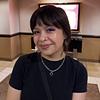Take a photo of a barcode or cover
Will probably go back to finish listening to the audiobook. I just always fell asleep.
Moderate: Child death, Racism
Two teenage lovers go blanketed in taunts and whispers and glares far harsher than the usual high school ragging that feels (almost) safe. In Jacqueline Woodson’s acclaimed 1993 novel If You Come Softly, the central relationship is larger than the nerd-jock pairing we’re used to, because this one? It’s interracial.
Jeremiah Roselind lives in Brooklyn, Elisha Eisen in Manhattan, their lives sitting just parallel to each other across the river. Both prefer diminutive versions of their names, Miah and Ellie. They come from rich families who live in expansive New York apartments. Miah’s divorced parents pay for theirs by acting and writing, while Ellie’s father is a high-paid doctor. Jeremiah is Black; Ellie is Jewish, representing the two races that have historically faced discrimination. In all, Woodson pairs up two houses that are both alike in dignity, indeed.
The novel’s conflict, then, arises purely from society, but only in a way that is stomachable for the emerging YA audience of the early 1990s. Compared to the current standards of YA romance, everything about the Miah and Ellie relationship feels pared back while remaining mostly believable. Miah and Ellie just like each other. They like talking to each other. They see no other future beyond each other. They are each other’s first love. That’s believable fifteen-year-old behavior, and it fulfills its purpose. However, on the issues of culture, Woodson treads carefully on the contact zone between blackness and whiteness, and even whiteness and Jewishness. Culture, and the way it reacts to another, is dutifully expressed by showing. In the Central Park scene, two older white women ask Ellie if she’s okay beside Miah. In another scene, white boys taunt the couple. Even Ellie’s sibling Anne is allowed to react negatively to her sister dating a black boy. And each judgment is remarked upon by the protagonists, with promises to rise above the discrimination, with sadness (mixed with naivete) at how the world is.
That’s all If You Come Softly does, really. It’s a movie where the emotional lives of the characters don’t penetrate deeper than what they say aloud to each other. It shows. It reacts. It, like a good teacher, prepares you for writers like Toni Morrison and Brit Bennett who are able to spin those observations into wisdom, into something with a bit of an edge.
In short: It’s just YA. What else can I say?




